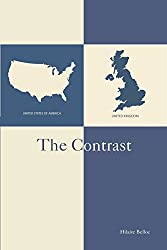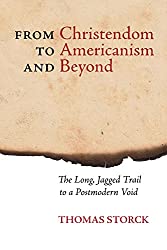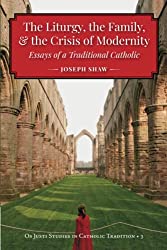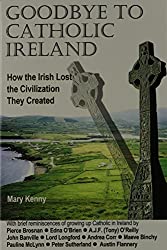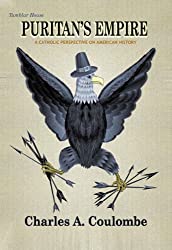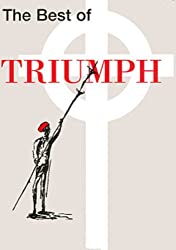
Gushing in public can be embarrassing—at least if one does it too often.
And having poured out enthusiasm for Peter Kwasniewski’s Resurgent in the Midst of Crisis last time, I feel reticent to repeat the act with Thomas Storck’s From Christendom to Americanism and Beyond: The Long Jagged Trail to a Postmodern Void. (Both books are also from Angelico Press who recently published my own book.)
But I can hardly help myself.
This book thrills me.
Long time readers of this site may understand my excitement better, when I say that Joseph Pearce, in the book’s introduction, describes Storck as a ‘worthy heir to Belloc’.
Well, when I consider the vast sweep, variety and originality of Hilaire Belloc‘s 150 books or so, I cannot name any living soul fully capable of following him.
However, I have long regarded Charles A. Coulombe as carrying Belloc’s torch and it is moving to discover much the same in Thomas Storck.
Now, Storck, like Belloc, is acutely aware of two spirits which have vied with each other these last five centuries for the Soul of the West.
The book’s title names these spirits as Christendom and Americanism. But, of course, things are never so simple as that. Vast, multifaceted phenomena are not easily confined to single categories and Storck, an American himself, means something much bigger by the latter term than simply what stems from America.
Rather, he speaks of something that classically has been called liberalism, an elastic word which, alas, is frequently misunderstood. As Storck writes:
Liberalism here … means something much broader than our contemporary American use of that word, and we would do well to put aside its ordinary meaning as we begin to consider the topic. We will be using the word in its European sense, the same sense incidentally, in which it is used in papal documents.
Liberalism, understood after this manner, is the chief enemy of the Church, and moreover has successfully assaulted Christian civilization on three levels and at three times, and unfortunately its triumph in each case has been nearly complete.
Liberalism is that general movement in Western civilization, which has sought freedom from the restraints imposed by Christian teaching, and therefore has attacked Catholic culture, first on the level of Christian economic morality, secondly on the level of the political rights of God, and lastly on the level of the human person itself.
And corresponding to these three intellectual assaults have been (first) the overthrow of the guilds and the establishment of individualistic capitalism, (secondly) the overthrow of traditional Catholic regimes, and (thirdly) the assault on humanity via such things as divorce, contraception, abortion, euthanasia and even the attempted overthrow of the natural and complementary division of mankind into two sexes.
Classically, then, liberalism includes what many Americans call conservative – that is: unbridled laissez faire capitalism. And one terrific strength of Storck’s work—which I find rare in American authors—is the unflinching recognition that such brutal capitalism is hardly Catholic.

Rather, it was born out of the initial liberal revolutions that began to consume Christendom, three hundred years ago. (For anyone who may be confused here, I might add that free enterprise certainly existed hundreds of years ago – but economic dominion by capitalists did not.) And, in all manner of ways, this modern dominion still continues to eradicate the last embers of Christendom …
What we have, then, in Storck’s book is a set of twenty one essays about modernity—from a staunch, uncompromising Catholic perspective. Yet despite the fact that these are different pieces written at different times, there is nonetheless a remarkable synthesis here – an extraordinary fusion of philosophical, cultural and historical insights that is nothing short of brilliant.
I repeat: brilliant – by which I mean to say that the book is filled with enormous erudition and cogent analysis, not only of liberal modernity, but of the Christendom it replaced—that far more organic social order in which the Faith permeated everything …
Moreover, the book features lucid warning as to all that is happening as the organic order continues to be assaulted and ever further broken down. Thus, Storck writes:
The latest assault by liberalism is the assault on the human person. It is the assault we are living with today, the contemporary and latest project of liberalism. But its roots are in the nineteenth century propaganda for divorce, and are presaged by the disordered lives of many of the eighteenth century liberals. But as an organized movement it first championed divorce; divorce was followed by contraception, contraception by abortion, abortion by euthanasia, euthanasia by homosexual conduct, homosexual conduct by the entire abolition of the two created human sexes.
But all these assaults are really attacks on the primal truth of the book of Genesis, “Male and female he created them” (Gen. 1:27). For the creation of man as male and female is a truth about marriage, and thus against divorce: about fertility, and thus against contraception and abortion; about human life, and thus against euthanasia; about the holiness of natural marital sex, and thus against homosexual acts; and especially against the notion that the two created sexes are arbitrary impositions on mankind.
Many people are unaware of the attempt to label the two created human sexes, male and female, as arbitrary and unjust impositions on humanity, but this is exactly what the cutting edge of liberalism is trying to do today. Their first tack was the attempt to separate sex from gender, that is, the biological fact of the two human sexes from their social and cultural expressions, which they term gender, and which are seen as totally socially constructed and in no way grounded in nature. Then, using such a phenomenon as “sex-change operations,” they begin to deny the very stability and reality of the two created sexes. After that, they claim that whether or not one undergoes such an operation, one’s subjective feeling about what sex/gender one is trumps the physical facts of one’s body …
Just as the early liberals resented the fact that God decreed justice and restraint in economic relations, and later on liberals resented the fact that the state had God for its author and was accountable to him, so now the latest wave of liberals resents the fact that God has created the human race as male and female.
Even if people mutilate their bodies to try to change what God has created, this does not and cannot change the facts. “Male and female he created them.” There are two sexes and the social expression of our sexuality, while to some extent dependent on cultural mores, must be rooted in the biological facts if it is to be healthy …
Wherever God has established order liberalism seeks to destroy it and to fulfill its own will …
The spirit of liberalism is at bottom opposed to the spirit of Catholicism.
Storck’s book then functions at two levels: a stark warning of the peril we face if we allow liberalism to continue wreaking havoc and a rich evocation of all we have lost and why we cannot rest a moment if we seek to rebuild it.
I close with a final commendation: Storck is a natural teacher. He takes account of the fact that many people today are unclear what such terms as ‘liberal’, ‘modern’, ‘post-modern’, ‘whig’ – even ‘capitalist’ actually mean. And he explains them in ways that are accessible, deftly elucidating their philosophical and historical provenance.
Indeed, I wish I had had this book years ago! It would have been particularly helpful to me, when I was just beginning to explore these things.
Now, I would not exactly describe it as a a primer or an ‘easy read for beginners’. Nonetheless, I still recommend it as a very good starting point for those prepared to study and think.
If you are just starting to ponder these issues, dear Lector, consider commencing with Storck. He lays out the territory in remarkably clear, helpful ways. But even if you know this territory well, be prepared for a book studded with jewels of insight. (And Americans, in particular I think, will find probing explorations of what Storck calls the ‘latent totalitarianism’ of their Supreme Court, Church-State relations etc.)
But really my last statements are a bit too measured, even restrained. Because, truly, this is one of those rare books that makes me want to shout from the rooftops: ‘Read Storck—and read him now!’
Foreword for Monarchy by Roger Buck
Buying Books at Amazon Through These Links Gives Us a Commission. This Supports Our Apostolate. Thank You if You Can Help Us Like This!

